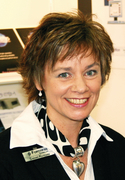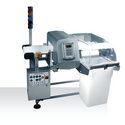Precision and profits
22 September 2009When you get them right, metal detection and checkweighing can add significantly to a company’s bottom line, as Joanne Hunter discovers
Strict due diligence in the food industry, the need for consumers to feel confident in food they buy and the sheer cost to a manufacturer of letting contaminated product slip through the net are factors that are relentlessly pushing metal detection technology to improve. Instrument makers that are set a challenge unfailingly respond and machines become ever more sensitive and reliable.
One invention is claimed by its developer to offer instrumentation that is ‘revolutionary and completely different’ and brings pharmaceutical standards to foods. On the eve of its public unveiling by Constant Instruments of Littlehampton, UK, Packaging Today spoke to managing director Leslie Hunt to hear why his company’s THS/MS21 metal detector (pictured) is causing excitement in the industry and is important for food sector customers.
This multi-spectrum (MS) system is fundamentally different from equipment that uses fixed frequencies or multifrequencies with high, medium and low zones says Mr Hunt. Multi-frequency antennae will identify the conductivity of a particular foodstuff within a range, but MS identifies the precise frequency for a product.
Incumbent technology adopts a frequency band and the technological revolution lies in its precision, continues Mr Hunt, who thinks it only logical that food manufacturers as part of an abiding strict health and safety regime should take notice of the THS/MS21.
Mr Hunt says: “For me, any company producing high quality goods and claims to perform due diligence means they are applying best techniques in the market. Anyone wanting to improve due diligence wants the ability to detect smaller and smaller parts.”
A passion for precision is evident in Mr Hunt, whose career path before Constant Instruments took him to Johannesburg working at De Beers diamond research laboratory. Unable to disguise his excitement about taking the market to a new level, he says: “What we’ve done is to give the availability of pharmaceutical-type traceability programming for the food industry.”
The Multi Spectrum 21 tag makes reference to its compliance with pharmaceutical industry legislation FDA 21 CFR Part 11 adopted three years ago which applies to traceability and recording of contamination in pharmaceutical products. The models in a range manufactured by Italian metal detection specialists Ceia SpA also meet HACCP and GMP criteria.
Constant Instruments can install special antennae into any of its detection machines, although it continues to supply metal detectors with the older technology.
By the time of a first public showing at the Packaging and Processing Machinery event in Birmingham, UK this month (September 2009), the THS/MS21 is already in use by an international confectionery group and a large meat processing company. In addition, Constant Instruments has installed three machines for a processor of medical dressings.
The ‘unprecedented’ sensitivity of the THS/MS21 in checking for metal contaminants is said to be up to 30% higher than for earlier models. Also, it will detect contaminant particles at high speed even in difficult, highly conductive products such as those containing high levels of salt or fat. The presence of a non-magnetic or magnetic metal particle triggers an immediate ejection of the product.
Data storage certifies production quality, the inspection itself and the programming operations.
The detector is designed to continuously compensate for any variations arising from environmental factors. According to the company, installation and maintenance has been made easier too, with new tools for technicians to measure the environmental compatibility of the detector. For example, there is an automatic examination of the degree of interference produced by the conveyor belt – particularly important given the ‘very high’ sensitivity of the THS/MS21.
Achieving perfection
Choosing the most suitable metal detection system is not an easy matter.
A chat with Sarah Ketchin, managing director of Fortress Technology (Europe), based at Banbury, UK, revealed a large, international metal detection specialist eager to help companies invest wisely to achieve perfection on their food processing and packaged goods lines.
Fortress’s European territories are France, Spain, Germany, Benelux, Ireland, Switzerland, Greece and Poland. “We are preferred suppliers to some large organisations including one of the largest bakeries in the UK. Systems that we provide cater for the major multinationals and the smaller start up companies,” says Ms Ketchin.
She observes that for smaller craft food manufacturers, the outlay on inspection equipment is probably the largest they will make to set themselves up to supply the major grocery retailers. Highly desirable, potentially lucrative business from a supermarket, apart from the associated cost, comes with a significant hassle factor, in that supermarkets tend to customise due diligence policies. This can turn selecting and buying into a headache. Every added feature will cost more and it is possible to overcompensate says Ms Ketchin.
She remarks: “We have a reputation for telling companies what you can and can’t do with an inspection system: we’d rather not see people misled.
“The latest in our range of end of line systems incorporates all the features specified by the leading retailers. Specifications have changed of late requiring the user to include more features. It is not so much about better sensitivity but about the features and failsafes of the system. Also, how easy they are to clean and maintain are important factors.”
Ms Ketchin, a director of the PPMA – specialist area, International - makes an important, practical distinction between checkweighing and metal detection. From a process point of view, a metal detector is a necessity, she says: “If a checkweigher fails you can take samples to a static scale and check off-line, if a metal detector fails you are stuck.”
And a learning mode in detection equipment is crucial, she adds: “When you set up any metal detector for a new product, the detector must calibrate to the product so it can ignore the good product and just look for a contaminant.” The new Phantom Gravity metal detector (see PPMA Preview) suitable for bulk dry, powder or granular products, has improved report generation and created a critical control point in HACCP food and
pharmaceutical safety programmes claims Fortress. Information can be stored for long periods and used to produce on demand customised reports.
Ms Ketchin adds: “The Phantom will warn you if the product is very conductive and will automatically change to a different level. This helps greatly with set-up and is designed to ensure that the detector is not likely to be falsely rejecting good product. With many companies now focusing heavily on reducing waste, keeping false rejects to a minimum is even more important.”
A specialist such as Fortress, will also custom-build machines to suit non-standard applications, which may be the best value solution, after all.
The THS/MS21 takes food inspection to a new level THS Sarah Ketchin, Managing Director, Fortress Technology, aims to take the pain out of buying Sarah Ketchin Companies must beware not to fall foul of Weights and Measures rules by skimping on servicing, says Avery Weigh-Tronix Avery Weigh-Tronix




